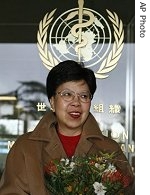2007年VOA标准英语-WHO Chief Warns Bird Flu Threat Has Not Gone Aw(在线收听)
By Lisa Schlein
Geneva
04 January 2007
The new director-general of the World Health Organization, Margaret Chan, warns the threat of an influenza pandemic has not receded. She urges countries around the world to prepare for a pandemic that has the potential to kill millions. From WHO headquarters in Geneva, Lisa Schlein reports on Dr. Chan's first news conference.
 |
| Margaret Chan, 4 Jan 2007 |
Prior to her appointment as WHO director-general, Margaret Chan headed the organization's avian-flu pandemic program. She has been involved with efforts to combat the disease since 1997, when she headed Hong Kong's public health program.
Chan says the H5-N1 bird flu virus has caused unprecedented damage to the poultry sector since its appearance a few years ago and it has killed more than half of the people that have become infected.
She believes the available evidence indicates the world is due for another pandemic soon.
"We owe it to the community we are serving to keep our watch, to be vigilant, on the watch out for early signs of a pandemic. The risk is there," she said. "We should not let our guard down. We are very concerned of the likelihood of a pandemic and particularly its impact in weak, in countries with weak, health systems and in countries in Africa where they have many people already affected by HIV/AIDS and other diseases."
Chan says 170 countries have pandemic preparedness plans, an increase from 50 in 1997.
She says implementation of revised international health regulations in June will help countries respond more effectively to bird flu outbreaks.
Director-General Chan cites the improvement of the health of women and the people of Africa as one of her main priorities. She says the World Health Organization has numerous programs dealing with these issues and she intends to make them better.
"We have a cluster called FCH-Family and Child Health - dealing with maternal health issues, child health issues and women's issues," noted Chan. "So, if that cluster as a group performed better and got synergy from the various programs, we are making improvements in the health of women and also in the health of Africa."
If a program is not working, Chan says something new must be tried. For example, she says her predecessor, Jong-wook Lee, realized that the "Roll Back Malaria" program was not winning the battle against malaria. So he introduced a new global malaria program, which, she says, she intends to follow.
"Three-thousand children die on a daily basis because of malaria," said Chan. "This is not acceptable. So, that is why we have a program which is very aggressive and very tough."
Chan says WHO must be prepared to change course when programs are not working. Otherwise, it will not remain relevant and will be left behind.